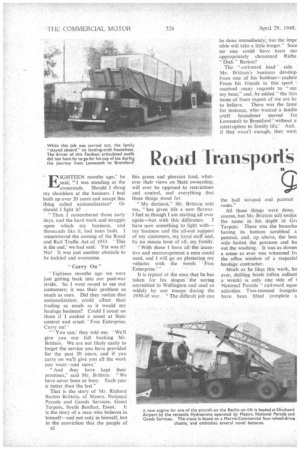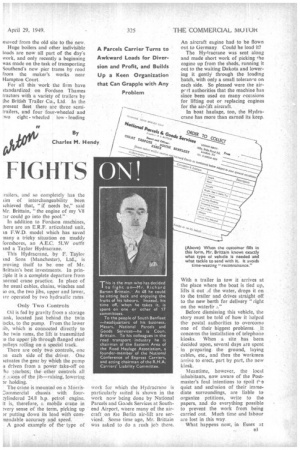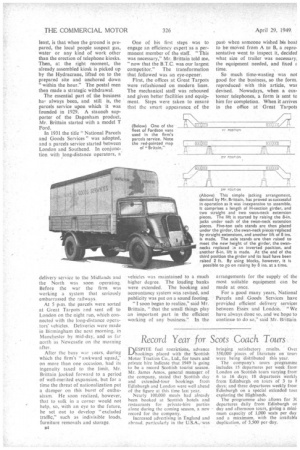Road Transports
Page 10

Page 11

Page 12

If you've noticed an error in this article please click here to report it so we can fix it.
FIGHTS
EIGHTEEN months ago,he said, "1 was standing at the crossroads. Should I shrug my shoulders at the business I had built up over 20 years and accept this thing called nationalization? Or should I fight it?
"Then I remembered those early days, and the hard work and struggle upon which my business, and thousands like it, had been built. I remembered the coming of the Road and Rail Traffic Act of 1933. 'This is the end,' we had said. Yet was it? No! It was just another obstacle to be tackled and overcome.
"Carry On" " Eighteen months ago we were just getting back into our post-war stride. So I went round to see our customers; it was their problem as much as ours. Did they realize that nationalization _ could affect their trading as much as it would my haulage business? Could I count on them if I cocked a snoat at State control and cried: 'Free Enterprise. Carry on!'
"'You can,' they told me. * We'll give you our full backing Mr. Brittain. We are not likely easily to forget the service you have provided for the past 20 years, and if you carry on we'll give you all the work you want--and more.'
"And they have kept their promises," said Mr. Brittain. We have never been so busy. Each year is better than the last."
That is the story of Mr. Richard Barton Brittain, of Messrs. National Parcels and Goods Services, Great Tarpots, South Benfleet, Essex. It is the story of a man who believes in himself—and not only in himself, but in the conviction that the people of B2 this green and pleasant land, whatever their views on State ownership, will ever be opposed to restrictions and control, and everything that these things stand for.
"My decision," Mr. Brittain told me, "has given life a new flavour. feel as though I am starting all over
again—but with this difference, I have now something to fight with-my business and the all-out support of my customers, my loyal staff and, by no means least of all, my family.
" With these I have all the incentive and encouragement a man could need, and I will go on plastering my vehicles with the words • Free Enterprise.'" It is typical of the man that he has taken for his slogan " the saying accredited to Wellington and used so widely by oar troops during the 1939-45 war. "The difficult job can
be done immediately; but the imp° sible will take a little longer." Sure no •one could have been mo appropriately christened Richa "Dick" Barton?
The "awkward load" side Mr-. Brittain's business develop' from one of his hobbies—yachtin From his friends in this -sport received many requests to mo my boat," and, he added the 'th:n some of them expect of me are ha to believe. There was the famil for instance, who wanted a landin craft houseboat moved fro Lowestoft to Brentford 'without ai interruption to family life.' And, if that wasn't enough, they want the hull scraped and painted route."
All these things were done, course, but Mr. Brittain still smiles the scene in his depot at Gil Tarpots. There was the househo having its bottom scrubbed a painted, and, up above, the hou; wife boiled the potatoes and hu out the washing. It was as domes a scene as ever was witnessed fa the office window of a respeetal haulage contractor.
Much as he likes this work, ho ever, shifting boats (often callecti a wreck) is only one side of National Parcels avvkward squai activities. Two-roomed bungalo have been lifted complete a moved from the old site to the new.
Huge boilers and other indivisible loads are now all part of the day's work, and only recently a beginning was made on the task of transporting Southend's new pier trams by road from the maker's works near Hampton Court For all this work the firm have standardized on Fordson Thames tractors with a variety of trailers by the British Trailer Co., Ltd. In the present fleet there are three semitrailers, and four four-wheeled and .we eight wheeled low loading .railers, and so completely has the tim of interchangeability been ichieved that, "if needs be," said Mr. Brittain, "the engine of my V8 :ar could go into the pool."
In addition to Fordson machines, :here are an E.R.F. articulated unit, in F.W.D. model which has saved many a tricky situation on muddy foreshores, an A.E.C. 5LW outfit ind a Taylor Hydracrane.
This Hydracrane, by F. Taylor Ind Sons (Manchester), Ltd., is p.oving itself to be one of Mr. arittain's best investments. In prin:iple it is a complete departure from lormal crane practice. In place of he usual cables, chains, winches and 3o on, the two jibs, upper and lower, ire operated by two hydraulic rams•
Only Two Controls Oil is fed by gravity from a storage :ank, located just behind the twin inks, to the pump. From the lower iib, which is connected directly to he twin rams, the lift is transmitted :0 the upper jib through flanged steel pulleys rolling on a special track.
There are only two controls, one
each side of the driver. One ictuates the gear by which the pump s driven from a power take-off on he ‘;-earbox; the other' controls all ..r..Itions Of the jib—raising, lowering
Pr holding.
The crane is Mounted on a Morris.?.ommercial chassis with law:ylindered .24.8 h.p. petrol engine. it is,. therefore, a mobile crane in ..very sense Of the term, picking up m. putting down its load with commendable accuraey and speed.
A good example of the. type of work for which the Hydracrane is particularly suited is shown in the work now being done by National Parcels and Goods Services at Southend Airport, where many of the aircraft on be Berlin air-lift are serviced. Some time ago, Mr. Brittain was asked to do a rush job there. An aircraft engine had to be flown out to Germany. Could he load it?
The Hydracrane was sent along and made short work of picking the engine up from the sheds, running it out to the waiting Dakota and lowering it gently through the loading hatch, with only a small toleran,7e on each side. So pleased were the airprrt authorities that the machine has since been used on Many eceasions for lifting out or replacing engines for the air-lift aircraft.
In boat haulage, too, the Hydracrane has more than earned its keep.
With a trailer in tow it arrives at the place where the boat is tied up, lifts it out _If the water, drops it on to the trailer and drives straight off to the new berth for delivery "right on the waterlir ;."
• Before dismissing this vehicle, the story must be told of how it helped the postal authorities to overcome one of their biggest problems. IL concerns the installation of telephone kiosks. When a site has been decided upon, several days are spent in preparingthe ground, laying cables, etc., and then the "workmen arrive to erect, part by part, the new kiosk.
Meantime, however, the local inhabitants, now aware of the Postmater's foul intentions to spoil ti-e, quiet and seclusion of their immediate surroundings, are liable to organize petitions, write to the papers, and do everything possible to prevent the work frorn being carried out. Much time and labour are lost in this way.
What happens now, in Essex at
least, is that whenthe ground is prepared, the local people suspect gas, water or any kind of work other than the erection of telephone kiosks. Then, at the right moment, the already assembled kiosk is picked up by the Hydraerane, lifted on to the prepared site and anchored down "within the hour." The postal men then made a strategic withdrawal, The essential part of the business hag always been, and still is, the parcels service upon which it was founded in 1929. A staunch supporter of the Dagenham product, Mr. Brittain started with a model T Ford.
In 1931 the title " National Parcels and Goods Services" was adopted, and a parcels service started between London and Southend. In conjunction with long-distance operators, a
delivery-service to the Midlands and the North was soon operating. Before the war the firm was working a system that seriously embarrassed the railways.
At 5 Rm, the parcels Were sorted at Great Tarpots and sent off to London on the night run, which connected with the long-distance opera. tors vehicles. Deliveries were made in Birmingham the next morning, in Manchester by mid-day, and as far north as Newcastle on the morning after.
After the busy war years, during which the firm's' " awkward squad' on more than one occasion, had its ingenuity taxed to the limit, Mr. Brittain -looked forward to a period of well-merited expansion, but for a time the threat of nationalization put a damper on this burst of enthusiasm. He soon realized, however, that to sulk in a corner would not help, so, with an eye to the future, he set out to develop "excluded traffic,' such as indivisible loads, furniture removals and storage,
One of his first steps was to engage an efficiency expert as a permanent member of the staff, "This was necessary," Mr. Brittain told me, "now that the B.T.C. was our largest competitor." The transformation that followed was an eye-opener.
First, the offices at Great Tarpots were refashioned on modern lines. The mechanical staff was rehoused and given better facilities and equipment. Steps were taken to ensure that the smart appearance of the
vehicles was maintained to a much higher degree. The loading banks were extended. The booking and accountancy system was revised, and publicity was put on a sound footing.
"I soon began to realize," said Mr. Brittain, "that the small things play an important part in the efficient working of any business." In the
past when someone wished his boat to be moved from A to B, a representative went to inspect it, decided what size of trailer was necessary, the equipment needed, and fixed 2 time.
So much time-wasting was not good for the business, so the form, reproduced with this article, was devised. Nowadays, when a customer telephones, a form is sent to him for completion. When it arrives in the office at Great Tarpots
arrangements for the supply of the most suitable equipment can be made at once.
For a good many years, National Parcels and Goods Services have provided efficient delivery services between Essex and London. "We have always done so, and We hope to continue to do so," said Mr. Brittain


























